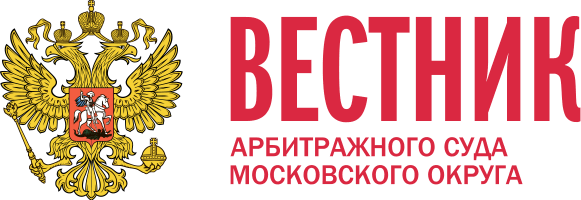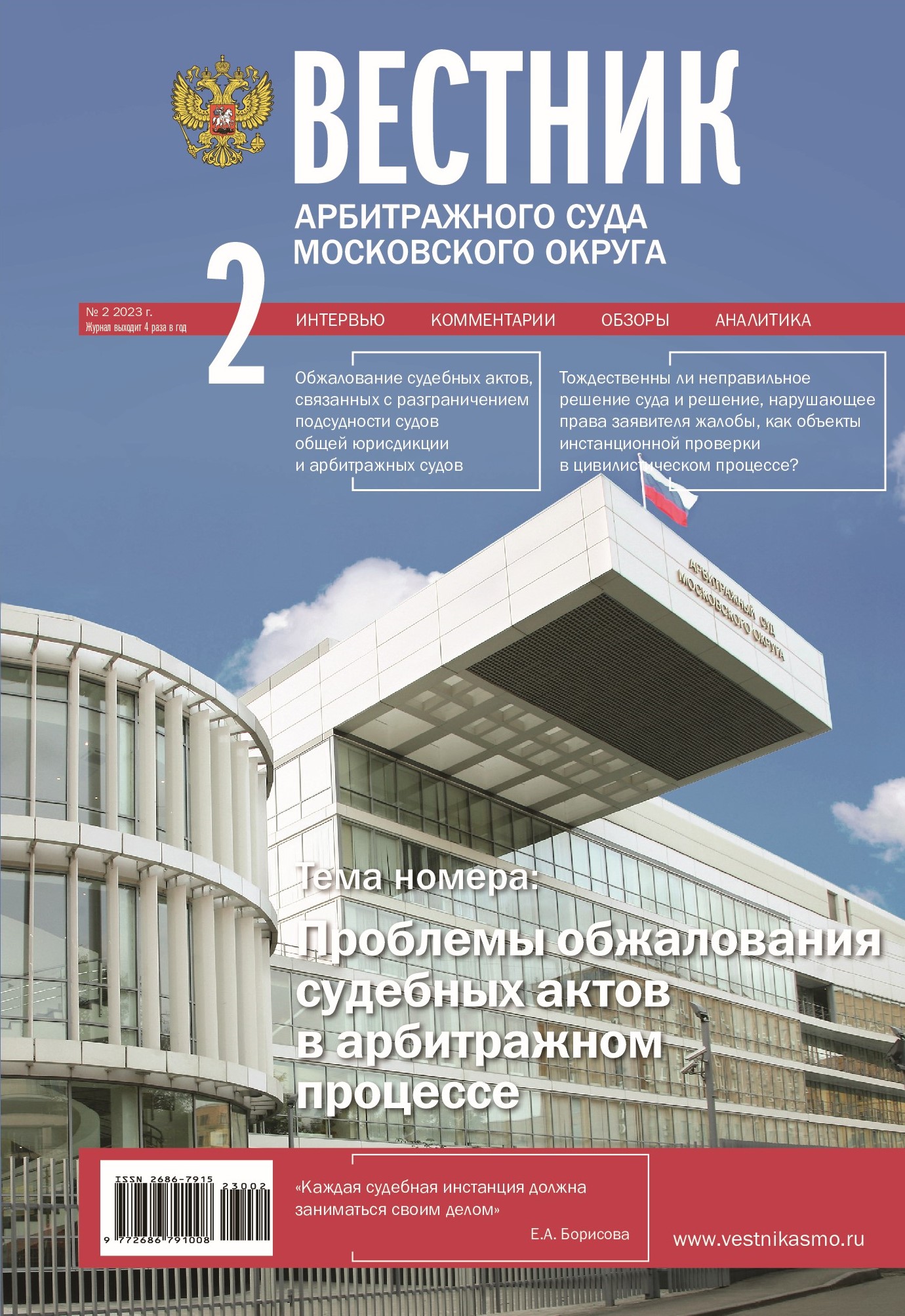Courts News
News of Moscow District Courts
Interview of the issue
E.A. Borisova. Each court should do its own thing
Topicality
Unfair character of actions of the previous bankruptcy trustee as a ground for restoring the missed procedural term
Problems of appealing judicial acts in arbitrazh (commercial) process
E.S. Smagina, A.S. Kozhukhova Appeal of judicial acts related to the delimitation of the jurisdiction of courts of general jurisdiction and arbitration courts
The article deals with the problems of applying the procedural consequences of violation of subject competence, as well as the admissibility of disputes about jurisdiction between arbitration courts and courts of general jurisdiction, and proposes a mechanism for their consideration.
Keywords: subject competence, transfer of a case by jurisdiction, appeal, disputes over jurisdiction
DOI: 10.46279/ASMO.2023.26.10.001
A.V. Yudin Are an incorrect court decision and a decision violating the rights of the applicant of the complaint identical as objects of remote verification in the civil process?
The Procedural law, defining the right to appeal judicial acts in a civil process, requires persons appealing a decision to indicate what the wrongness of the decision is, to give grounds for its cancellation. At the same time, there is no requirement to argue how the appealed judicial act (its motives and/or resolutions) violate the rights and interests of the person. Often, a decision taken in a case involving a person, although having the status of a person participating in the case and having the right to appeal against a judicial act, may not affect his rights and legally protected interests (for example, appealing a decision taken in favor of the person himself in order to achieve maximum delay in entry it has entered into legal force, since the proceedings in another case have been suspended up to this point). The article resolves the questions of what legal significance the fact of violation by a court decision of the rights and legally protected interests of the person appealing against it has, and whether such a subject has the right to appeal the decision (understood not only as the right to appeal to the court of verification instance, but also as the right to a positive result of consideration of the complaint); does a person have the right to appeal with reference to the actual or alleged flaws of such a decision for the abstract restoration of legality, or is this subject obliged to indicate (prove) how the decision violates his rights and legally protected interests. The question raised is directly related to the problem of legal interest in the civil process, which is also given considerable attention in the work. The reason for the absence of the need to determine the legal interest of subjects at the stages of reviewing judicial acts lies in the fact that by this point, legal interest, as a rule, has already been the subject of an assessment by the court of first instance, and the revision of these conclusions will either be impossible or irrational, or will be reduced to a critical assessment of the conclusions of the court of first instance on the merits of the dispute, however, this approach will not be universal. It is of principle that any violation claimed by the applicant of the complaint and established by the court must be a violation of the rights and legally protected interests of the applicant of the complaint, with the exception of those violations whose detection is attributed to the initiative of the court. The current legislation, establishing a register of grounds for the cancellation of judicial acts, with which the arguments of the complaint should be consistent, does not require that the person presenting the relevant arguments legitimize himself as a “victim” of such violations. The applicant of the complaint can refer to any violations, including which also took place in relation to other participants in the process, which seems to be erroneous. The greatest potential for the practical application of the criterion of interest is found in the reaction of the court of the verification instance to the appeal of the decision by the subjects, although they have the right to appeal due to the status of the person participating in the case, however, the rights, obligations and interests of which the decision itself (or the shortcomings alleged in it) does not violate in any way. Answering the question put in the title of the article, the author comes to the conclusion that an incorrect court decision and a decision violating the rights of the applicant of the complaint, as objects of instance verification in the civil process, are different phenomena.
Keywords: appeal; cassation appeal; decision violating the rights and legally protected interests of a person; appeal; cassation appeal; incorrect decision; illegal and unjustified decision
DOI: 10.46279/ASMO.2023.34.13.002
L.A. Terekhovа Variety of proceedings in the first cassation instance of the arbitration court
The article analyzes the approaches of the legislator, the clarifications of the Plenum of the Supreme Court of the Russian Federation, which form the diversity of proceedings in the court of cassation. The procedure for considering cases, although focused on using the rules for considering cases in a court of first instance, still differs in variability, depending on the type of the appealed act or the issue to be considered, and, of course, is determined by the level of the cassation court in the judicial hierarchy.
Keywords: cassation proceedings, cassation instance, cassation courts, summary proceedings, judicial acts review system, powers of the cassation court
DOI: 10.46279/ASMO.2023.48.69.003
M.Sh. Patsatsiya On the admissibility of the application by analogy of the law of the norm of paragraph 2 of part 2 of Art. 327.1 of the RF Civil Procedure Code in appeal of the judicial acts in part
Legitimization of procedural analogy (part 3 article 5 of the RF Civil Procedure Code (CPC RF)) in arbitration proceedings has noticeably affected the procedural activity of arbitration courts, including appeal courts. This innovation has also effected the limits of appeal of judicial acts in part. Judicial practice of appellate and cassation (first cassation) courts has appeared. It shows that these instances, respectively, apply or evaluate the application by analogy of the law of the norm of paragraph 2 of part 2 of article 327.1 of the CPC RF, according to which ‘the court of appeal instance in the interests of legality has the right to check the decision of the first-instance court in its entirety’. Thus, there is a need to evaluate the approaches of courts on the admissibility of the specified procedural analogy. This article is devoted to this problem, the comprehension of which, judging by the publications in the specialized literature, has yet to begin.
Keywords: appellate review of judicial acts in part; appellate review ‘in the interests of legality’; of judicial acts, appealed in part; procedural analogy; gap in the CPC RF; qualified silence of the legislator; efficiency of arbitration proceedings
DOI: 10.46279/ASMO.2023.85.18.004
V.V. Zakharov Judicial workload optimization: the role of successive appeals against judicial acts
The article analyzes to what extent the consistent appeal of judicial acts contributes to reducing the judicial workload. The rationality and justification of the allocation of exceptions to the rule of successive appeal of judicial acts are analyzed and proposals are made to expand the list of such exceptions to regulate the workload in the appellate and cassation instances.
Keywords: arbitration process, appeal against judicial acts, revision of judicial acts, bankruptcy, court costs, verification instances, Arbitration Procedure Code of the Russian Federation, Supreme Court of the Russian Federation
DOI: 10.46279/ASMO.2023.47.23.005
Analytics: Open Tribune
A.S. Yakovlev Principle of binding judicial acts in a bankruptcy case: the problem of contrasting judicial acts on recovery from a debtor to its bankruptcy creditors
This article studies the problem of opposing the conclusions of court acts issued in a general lawsuit against a debtor, subsequently recognized as bankrupt, against the arguments of the bankruptcy creditors of such a debtor. This problem is investigated from the point of view of such properties of the legal force of a judicial act as prejudicial and binding (generally binding). The author concludes that there are two approaches to the solution of this problem in the current judicial practice. When applying the dominant approach, the bankruptcy creditor is forced to use the means of ordinary procedural appeal in respect of judicial acts on recovery from the debtor, issued in a lawsuit. This approach is not without a number of disadvantages, the main point of which is to limit the rights of the bankruptcy creditor to raise objections. A less common alternative approach allows for the possibility of revision of the conclusions of the judgment on recovery from the debtor in the bankruptcy case when considering the validity of a particular creditor’s claims. As a result, the author concludes that it is advisable to expand the cases of application of the alternative approach.
Keywords: legal force of a judicial act, prejudicial nature of a judicial act, binding nature of a judicial act, revision of judicial acts, insolvency
DOI: 10.46279/ASMO.2023.99.19.006
N.A. Denisova Circumstances certified by the notary when performing notarial acts as a basis for exemption from proving in civilized process
The article deals with the issue of increased evidentiary value of facts certified by a notary when performing a notarial act. In particular, the author investigates the place of notarial acts in the system of means of proof, the characteristic features of notarial acts as authentic are highlighted. As a result of the analysis of positive law norms, the author concludes that the attribution of circumstances established by a notary to the group of circumstances that do not require proof cannot be recognized as successful due to the difference of the pursued goals of legal constructions. The variants of change of the legislation according to the results of the conducted research are offered.
Keywords: notarial acts, grounds for exemption from proof, authentic acts, increased evidentiary value, means of proof
DOI: 10.46279/ASMO.2023.20.26.007
M.E. Aliverdieva Problems of streamlined proceedings implementation of case-handling in an arbitration court
Within the framework of the article, the provisions of the Arbitration Procedural Code of the Russian Federation and judicial practice of streamlined proceedings of arbitration cases are analyzed. The main problems of this procedural form within the arbitration legislation are identified — during the transition from the streamlined proceedings to the general proceedings for considering cases, the possibility of a streamlined proceedings for considering disputes of a non- property nature, and streamlined proceedings during the retrial of cases.
Keywords: streamlined proceedings, arbitration process, streamlined proceedings problems
E.S. Tueshova On the Issue of Cryptocurrency Vindication
Ensuring economic interaction depends on how effectively the legislator manages to solve two opposite tasks related to the formation of instruments for protecting the rights of the owner of property, but not undermining the efficiency and stability of turnover. The model of civil turnover that has developed within the framework of a certain law and order may provide either an unconditional priority for the protection of the rights of a bona fide acquirer, or be based on the institution of vindication, which gives the owner extensive powers to claim his property from someone else’s illegal possession. The choice of a specific legal regime is associated with the implementation of the legislator’s own discretionary powers. The conclusion is formulated about the need to build a special vindication model for the protection of the rights of the owner of the digital currency, and the principles that should be put into its basis.
Keywords: objects of civil rights; vindication; digital currencies; protection of rights; things; disembodied things; property law; civil law; ownership; digital rights; cryptocurrency
Court practice reviews
Results of analysis of the practice of dispute resolution related to the peculiarities of granting state or municipally owned land plots on which buildings, structures are located
Review of court practice on disputes related to unauthorized construction
Working group to discuss the practice of application of the APC RF
Minutes No. 172 of the meeting of the working group to discuss the practice of application of the Arbitrazh (Commercial) Procedure Code of the Russian Federation


